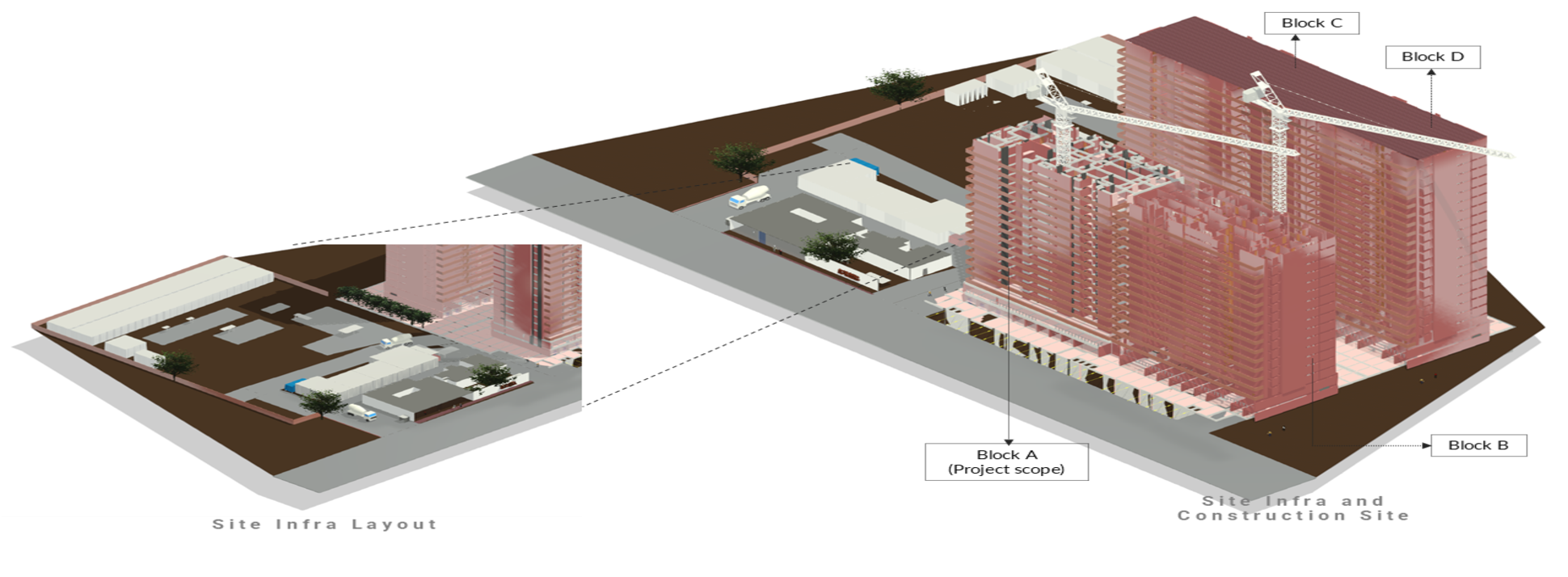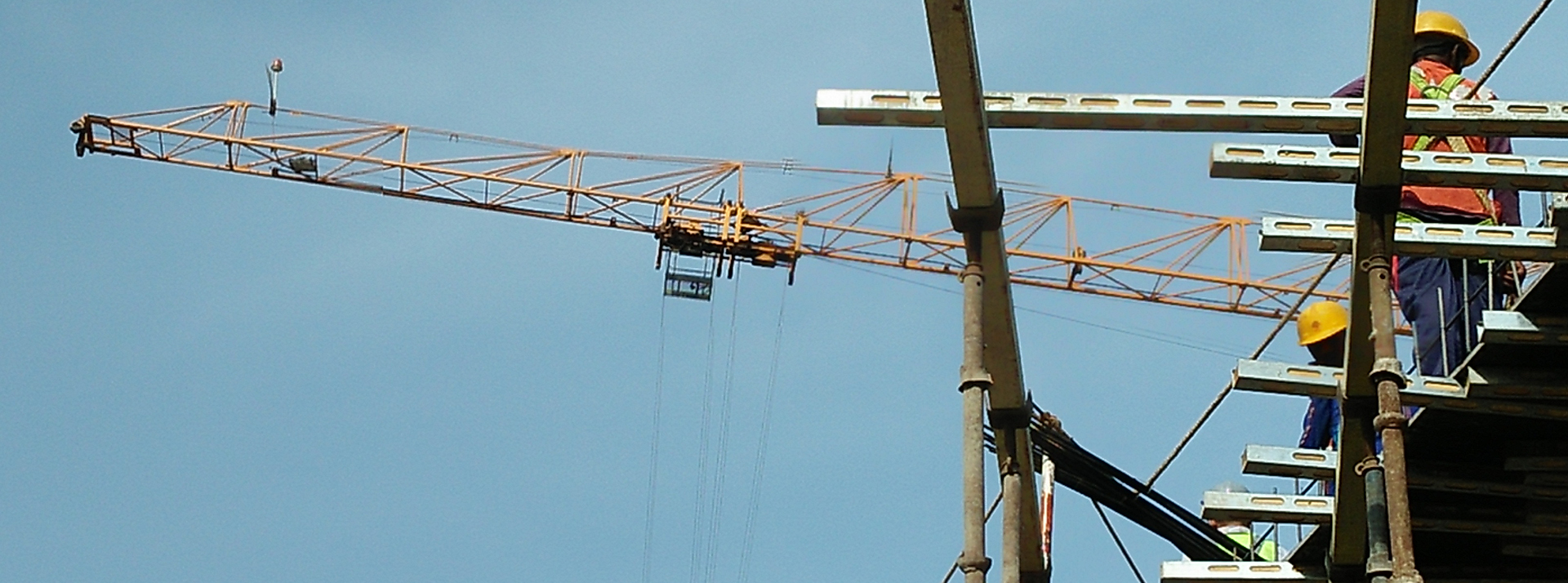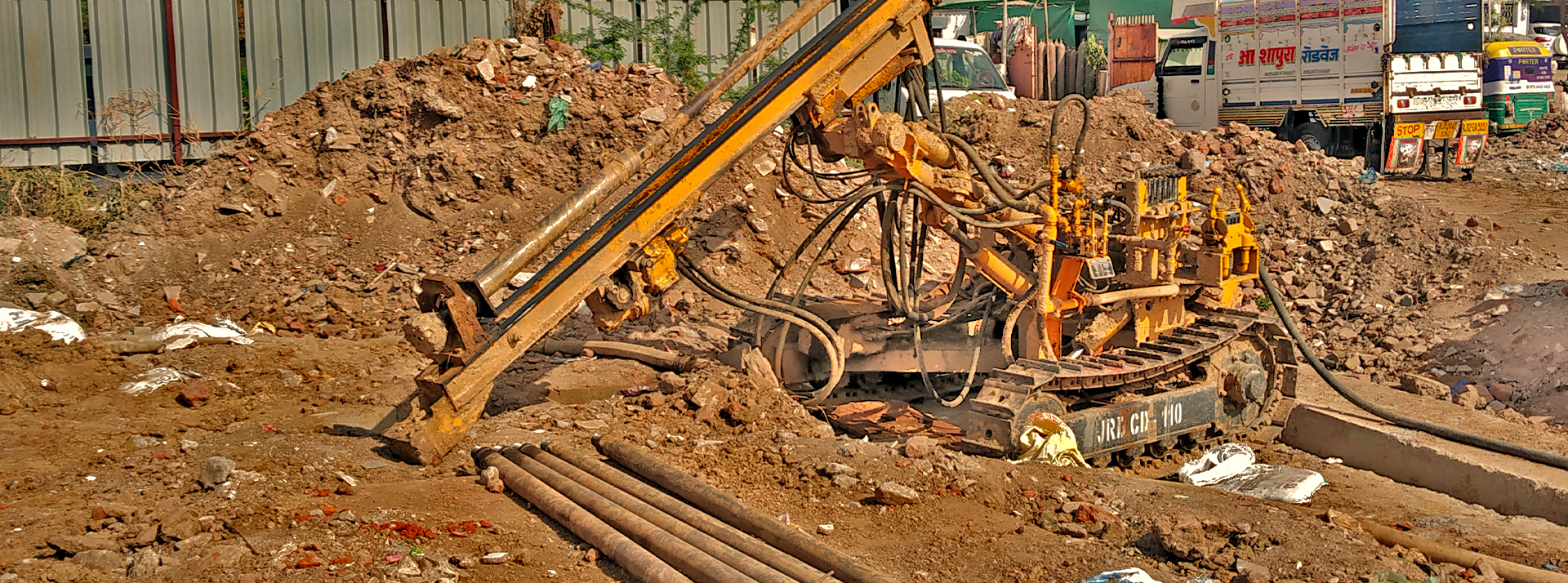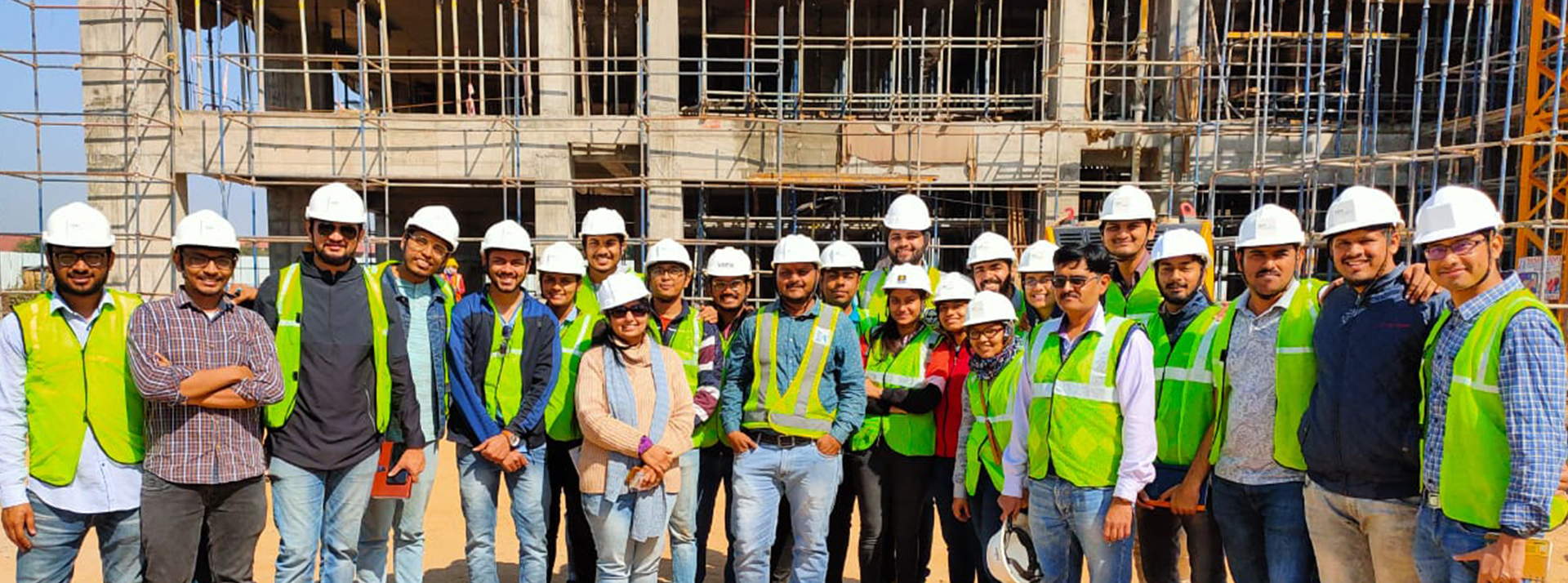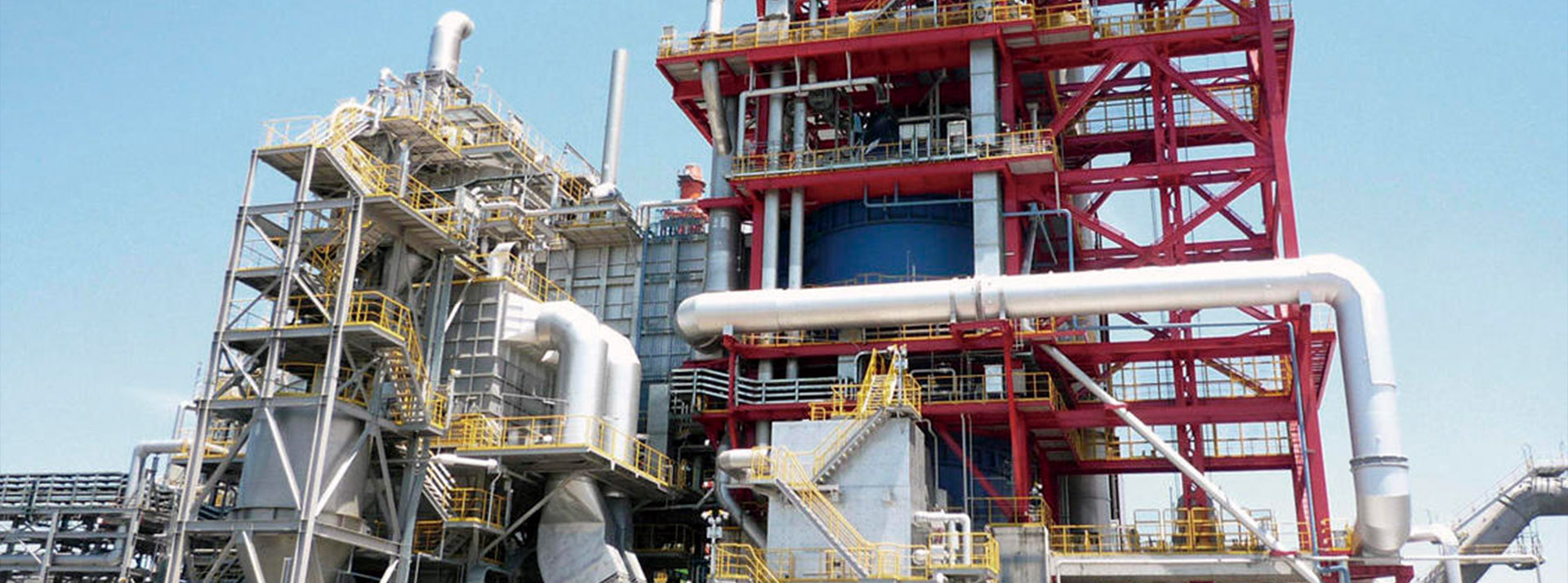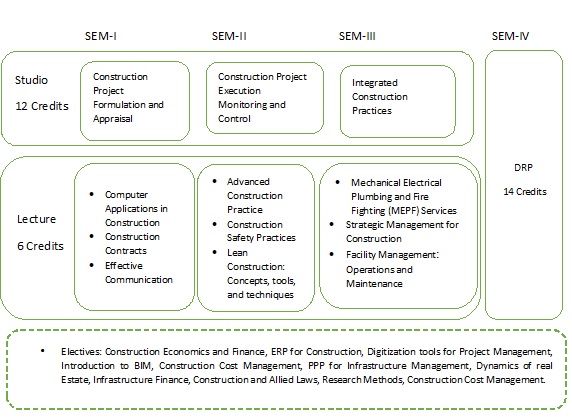Curriculum
Master’s in Construction Engineering & Management
The program of construction engineering and management is a flagship course that promotes careers in construction management. The course is designed as a knowledge consortium of construction technology, organization, time management, and presentation skills. It gives students a glimpse into the real world scenario of construction practice, as well as an opportunity to showcase their talents in the form of studio based pedagogy. In addition to providing a significant learning opportunity, the program fosters an environment that will bring out the best in each individual; encourage dialogue among the students; and foster team spirit as students rise to meet challenges of construction industry.
*The courses/titles may change as a part of regular updating and improvements.
Course Summary
The studio courses focus on Construction Project formulation and appraisal, Construction Project Execution Monitoring and Control, Integrated Construction Practices (Building Information Modelling (BIM) Process Implementation, Digitization in construction and Lean Practices). Students learn to use project management software (MSProject, Primavera), Virtual modelling etc and simulate live projects and get exposed to field practices. The lecture courses help the students to explore skills of construction finance, strategic management, advance construction practices, construction contracts, and quantitative techniques and risk management. We have recently initiated FT-BIM Advancement Lab in association with Bentley BIM Institute with more than 50+software’s. This facility at FT will be nucleus for a consortium of facility owners, contractors, consultants, and researchers formed to address need-based research for the industry.
Construction Project Formulation and appraisal Studio Sem-I:
This studio begins with the identification of construction project which is in conceptualization stage (also often mentioned as in the pipeline stage). After selection of this project, the studio starts investigating this potential project from various dimensions. These dimensions include risk management, stakeholder management, bid process management, locational analysis, financial analysis, project scheduling, project controls, cost benefit analysis, environment impact assessment and technical analysis, The viability of the selected construction project is questioned from the perspective offered by each dimension.
Key Learning Outcomes of Construction Project Formulation and appraisal Studio Sem-I:
Understanding all aspects of Formulating detail project conceptualization and development phase of project life cycle.
Students will select a project and apply all the learning principles of conceptualization and planning of construction management to it.
Construction Project Execution Monitoring and Control Studio Sem-II:
The execution phase is the most important aspect of the construction project life cycle. Resources like time, money, manpower, machines, materials and so on are planned, allocated, used and controlled to meet the expectations of client or facility users. This phase is performed within the boundaries of time, cost, quality, and safety, as defined and expected by the client. As part of this studio, construction processes at a construction site will be analysed from the perspective of knowledge areas like construction cost management, construction quality management, construction safety management, construction planning and control, management information system, lean construction and so on. The analysis will involve collecting different forms of data like site observations (photographs and videos), contract documents, quality assurance and control plan, safety management plan, bill of quantities, rate analysis, checklists and formats used for monitoring and controlling of different construction processes.
Key Learning Outcomes of Studio Sem-II:
- The studio will equip students to investigate and analyse construction execution processes gain knowledge of preconstruction activities, safety, quality, resources, and productivity planning monitoring aspects of construction project. and control processes.
- The studio will equip students to investigate and analyse construction progress (time &cost) monitoring and control processes and become change agents in implementation of best practices and improve the state of art at construction sites.
Integrated Construction Practices Studio Sem-III:
The Integrated Construction Practices course has been designed from ground up to address the challenges of modern construction projects. Based on theoretical foundations of lean construction, the course teaches the key building blocks of digital construction practices through real-life case study-based course work.
Key Learning output of Integrated Construction Practices Studio Sem-III:
- The student will be able to Investigate Integrated approach of collaboration in the project domain of architecture, structure and MEPF under platform of BIM and Lean Construction Practices.
- The studio will equip students to investigate and analyse pitfalls of traditional construction process. Investigating how each stakeholder plays a role in deliver a construction project through simulation to become change agents in implementation of best practices and improve the state of art at integrating construction practices through integrated project delivery approach.
Computer Applications in Construction:
The management of construction projects is highly demanding and involves wide range of tasks. It involves all managerial functions, forms of organisation, techniques and tools and the range of activities expands with the complexity of the project, as does the amount of data. Conventional methods in construction lacking an organized and systematic approach are inadequate, and often lead to inefficiency and waste. Sophisticated information and data handling capabilities of an electronic computer offer many helpful ways to produce a better control in construction management of projects for less money and quick decision making for project management.
Key learning outcome of Computer Applications in Construction course is analytic approach towards applying tool of project management software (MS Project/Power BI) formulation and implementation in the project planning and scheduling.
Construction Contracts:
There is, in addition, an ever-increasing sophistication in the procurement process, formation of contract, related law and regulation. Contract Administration is the process of systematically and efficiently managing contract creation, selection of type of contract, execution, analysis for the purpose of maximizing financial, operational performance and minimizing risk. Students of this course will become acquainted with the ‘know –how and know-why’ of the procurement and contract development process for diverse projects at every scale.
Key Learning outcome of Construction Contracts:
The course output is understanding essence of contracts, different methods of project delivery and the roles & responsibilities of all constituencies involved in design and construction process.
- Acquaint with the current amendments in Bidding process adopted in Construction Industry
- Comprehend, analyse, synthesize, and evaluate the project delivery methods used in construction Industry.
Effective communication:
The Writing and Communication course sets out to familiarize first year of Master’s students with writing and research. The course engages the students in an intensive writing practice in which they learn different forms of writing and practice techniques along with a formal presentation. The larger aim of the course is to turn writing into a powerful tool for students to use in their professional and/or academic endeavours and hence they also use data from the field. Upon completion, the students will be able to use writing as a way to ideate and convey their logic, the processes they follow, and analysis they do as field experts to a varied audience.
Key Learning outcome of Construction Contracts:
Students will be able to utilize writing as a powerful tool, employing forms and techniques learned during intensive practice, to ideate and effectively convey their logic, processes, analysis, and field expertise to diverse audiences in both professional and academic settings.
Facility Management: Operations and Maintenance:
The course introduces students to terminologies, theories, practises, and case studies of facility management for developing knowledge and skills that are required for supporting well-functioning, effective, and efficient infrastructure services integrated with a better built environment. Introduction to Facilities Management for the Built Environment with a Perspective on Infrastructure and Construction Operations is part of the present course.
Key Learning outcome of the course Facility Management:
The course output is to understand why it is important to incorporate Post occupancy building Maintenance aspects into consideration whist early stages of construction and how to make the post-construction works effective and optimal. Analysis and Investigation of operation and maintenance Audits of Road Infrastructure projects.
MEPF Services:
MEPF coordination is all about detecting and resolving clashes among trades – architectural, structural, mechanical, electrical, plumbing and fire safety before construction starts. To keep the harmony between these separate designs, it's essential to have a coordination of updated designs of each discipline. Mechanical, Electrical, & Plumbing (MEP),Fire Fighting coordination services integrate each team’s design to address any conflicts during the constructability review process.
Key Learning outcomes:
The outputs of course of MEPF is of system integration of construction projects in coordination of services and utilities. It will develop good Insight for Space Planning of MEPF Services. Understanding of Codal/Design considerations and Analytical Approach for evaluation of design and better understanding for Coordination of Services for Project Management.
Advanced Construction Practices:
This course exposes students to current advanced construction technology practices adopted in large construction projects. It includes high rise building construction planning and scheduling of Materials -Manpower, Machineries, Money, and management (Methodology) (5 M). for construction projects. Construction Methods for improving the properties and performance of materials, enabling structures, pre-casting, and pre-stressing of concrete and latest techniques of construction practices. Learning pedagogy will be based on case studies and site visits will be arranged.
Key Learning outcome of Advanced Construction Practices:
It will build ability to Plan and Schedule High-rise Building Construction Practices with Modular shuttering or tunnel formwork system, precast and pre-engineering building solutions. Students will be able to plan for equipment management, underground construction methods and infrastructure projects.
Strategic Management for Construction:
This subject is about the fundamental aspects of primary concerns of senior management of any business firms. Firms have choices to make if they are to survive and prosper. Those which are strategic include: the selection of goals, the choice of products and services to offer; the design and configuration of policies determining how the firm positions itself to compete in product-markets (i.e., competitive strategy); the choice of an appropriate level of scope and diversity; the different options in terms of directions and ways to manage a turnaround situation.
Key Outputs:
The students will be trained towards Analyse a company's strategy in relation to its global environment, using selected strategic management concepts and tools.
- Assess a company's strategic coherence and strategic effectiveness
- Make recommendations for company strategy based on the analysis and assessment
- Write a professional-quality document on your analysis, assessment, and recommendations
- Deliver a professional-quality presentation on your assessment and recommendations
Construction Safety Practices:
Construction safety and health delivers an understanding of health hazards and project controls of the various phases of construction. Covers appropriate Occupational Health and Safety norms and guidelines, requirements for safe workplaces; updates of regulations; techniques of planning and risks for safety in construction processes. This course will be a first step towards grasping the concepts of construction safety standards and guidelines applicable to construction industry. Students will understand the minimum requirements for a health and safety program for construction activities.
Key Learning Outcome for Construction Safety Practices course:
The student will be able to analyse safety practices in construction projects from the perspective of identification of hazards of construction and able to recommend appropriate control measures to eliminate or minimize hazards. Students will be able to evaluate safety compliances pertaining to construction practices. Identifying the requirements for health and safety at work, understanding the health and safety management systems
Lean Construction: Concept, Tools and Practices:
The philosophy of lean has already transformed the manufacturing sector across the world and currently it is making inroads in the global Architecture, Engineering and Construction (AEC) sector. This course focuses on principles of lean construction and further dwells into various lean tools that have been used widely across AEC sector. This course uses various simulations to understand the lean concepts and tools in true essence and then discuss its potential in construction sector. The concept of lean construction aims for value maximization for the client, waste reduction and continuous improvement. Each word mentioned in the earlier statement lays the foundation of lean construction and has altogether different interpretation than used in common parlance.
Key Learning Outcome of Lean Construction: Concept, Tools and Practices course, the student will be able to analyse existing practices in construction projects from the perspective of lean principles and suggest areas of improvements.
DRP:
Research Thesis program is introduced to complement the practical work and problem-solving abilities of students and to contribute to a higher professional competence and developing an attitude towards research. A research-based thesis focuses on answering a set of research questions, which may involve proposing a hypothesis and works towards proving or disproving that hypothesis. It involves comprehensive literature research that consists of research papers or other relevant literature, which would include a critical review. Its basis is scientific rigor, use of experiments, data collection, analysis, and critical thinking. Application for existing theories and models to a new context, with necessary adaptations and justification, would also be a legitimate research thesis.

